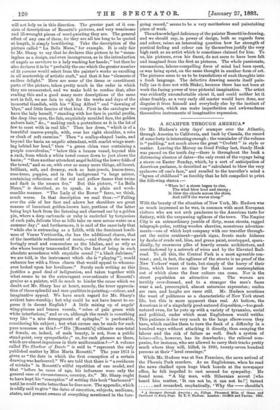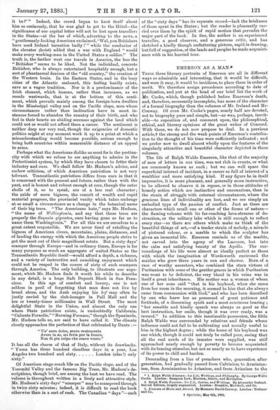A SCAMPER THROUGH AMERICA.*
OF Mr. Hudson's sixty days' scamper over the Atlantic, through America to California, and back by Canada, the record of some forty is interesting enough ; the remainder of the volume. is "padding," not much above the great " Crofutt " in style or matter. Leaving the Mersey on Good Friday last, Sandy Hook was passed on the tenth day—there is throughout the book a distressing absence of dates—the only event of the voyage being
a storm on Easter Sunday, which, by a sort of anticipation of American parlance, is described as "calculated to blow the very eyebrows off one's face," and recalled to the traveller's mind a "hymn of childhood" so forcibly that he felt compelled to print the following stanza :—
" When lo ! a storm began to rise,
The wind blew loud and strong ; It blew the clouds across the skies, And roll'd the waves along."
With the beauty of the situation of New York, Mr. Hudson was as much impressed as he was, in common with most European visitors who are not arch panderers to the American taste for flattery, with the surpassing ugliness of the town. The Empire City is an extraordinary jumble of dirty, mean streets, ragged telegraph-poles, rotting wooden shanties, monstrous advertise- ments—one of which kept company with our traveller through- out the entire continent—garish signs, fronts made hideous by daubs of crude red, blue, and green paint, overtopped, spora- dically, by enormous piles of heavily ornate architecture, and overshadowed by a network of wires and by the Elevated Rail- road. To all this, the Central Park is a most agreeable con- trast; and, in fact, the ugliness of the streets is no proof of the New Yorkers' want of taste, but simply of the hurry of their lives, which leaves no time for that inner contemplation out of which alone the finer culture can come. Nor is the street population an attractive one. The women are terribly over-dressed, and to a stranger the men's faces wear a sad, preoccupied, almost saturnine expression; smiles are rare, and laughs are rarer still. Mr. Hudson mentions the want of politeness as a characteristic of New York street life, but this is more apparent than real. At bottom, the American is of a singularly good-natured disposition,—too good- natured even, for he puts up with a variety of tyrannies, social and political, under which most Englishmen would writhe.
This patience is due very much to the large elbow-room they have, which enables them to turn the flank of a difficulty in a
hundred ways without attacking it directly, thus escaping the labour and the risk of failure as well. Such a system of laissez-aller, however, has its drawbacks ; the railroad com- panies, for instance, who are allowed to carry their tracks pretty much where they will, killed, in 1880, twenty-seven hundred persons at their "level crossings."
While Mr. Hudson was at San Francisco, the news arrived of the Phcenix Park murders. As an Englishman, when he read the news chalked upon huge black boards at the newspaper office, he felt impelled to cast around for sympathy. He
found none. "A big man, with Hibernian accent [who heard him mutter, 1It can not be, it can not be !'] turned
and remarked, emphatically, Why the — shouldn't
• A Scamper through America ; or. Fifteen Thousand Miles of Ocean and Continent in Sixty Days. By T. S. Hudson. London ; Griffith and Farrau. 1882.
it be P' " Indeed, the crowd began to knot itself about him so ominously, that he was glad to get to the Hotel—the significance of our capital letter will not be lost upon travellers in the States—at the bar of which, adverting to the news, a "gentlemanly-looking American exclaimed, 'Wal, you Britishers have used Ireland tarnation badly !" while the conductor of the elevator (hoist) added that a war with England "would make every working-man in the "United States a soldier:' The truth is, the farther west one travels in America, the less the " Britisher " seems to be liked. Not the individual, concrete Britisher, who is always entertained hospitably enough, but a sort of phantasmal denizen of the "old country," the creation of the Western brain. In the Eastern States, and in the busy cities of the Atlantic seaboard, this feeling hardly exists, save as a vague tradition. Nor is it a predominance of the Irish element, which lessens, rather than increases, as we recede westwards, that is at the bottom of this senti- ment, which prevails mainly among the foreign-born dwellers in the Mississippi valley and on the Pacific slope, men whom circumstances rather than inclination have in most in- stances forced to abandon the country of their birth, and who feel in their hearts an abiding soreness against the land which could not or would not afford them a career. The sentiment is neither deep nor very real, though the exigencies of domestic politics might at any moment work it up to a point at which a misunderstanding would become possible, serious enough to bring both countries within measurable distance of an appeal to arms.
Perhaps what the Americans dislike us most for is the pertina- city with which we refuse to see anything to admire in the Protectionist system, by which they have chosen to fetter their industry and ours. We shall follow Mr. Hudson's advice, and eschew criticism, of which American patriotism is not very tolerant. Transatlantic patriotism differs from ours in that it is concerned with the present and future, rather than with the past, and is honest and robust enough at core, though the outer shells of it, so to speak, are of a less real character ; the pride of mere bigness, the conceit of wealth and rapid material progress, the provincial vanity which takes umbrage at so small a circumstance as a change in the botanical name of their big trees. "The Americans hate," says Mr. Hudson, "the name of Wellingtonia, and say that these trees are properly the Sequoia gIgantea, once having gone so far as to name them Washingtonia." For all this we are ourselves to a great extent responsible. We are never tired of extolling the bigness of American rivers, mountains, plains, distances, and of lauding the energy with which the American people strive to get the most out of their magnificent estate. But a sixty days' scamper through Europe—and in ordinary times, Europe is for many purposes as much an aggregate of united States as the Transatlantic Republic itself—would afford a depth, a richness, and a variety of instructive and ennobling enjoyment which could not be reaped in the course of sixty of such scampers through. America. The only building, to illustrate our argu- ment, which Mr. Hudson finds it worth his while to describe in any detail, is a huge Safe Deposit Block in San Fran- cisco. In this age of comfort and luxury, one is not .seldom in peril of forgetting that man does not live by bread alone, and the Arab enjoying his kef may often be justly envied by the club-lounger in Pall Mall and the ten or twenty-times millionaire in Wall Street. The most delightful State in the Union, and almost the only one where State patriotism exists, is undoubtedly California, " Caliente Fornella," "Burning Furnace," though the Spaniards, Mr. Hudson tells us, are said to have called it. The climate closely approaches the perfection of that celebrated by Dante :—
" Un' aura dolce, sense nwitamento Avere in se, mi feria per la fronte, Non di pin colpo che soave vento."
It has all the charm of that of Italy, without its drawbacks. "Yuma has three hundred cloudless days in a year, Los Angeles two hundred and sixty London (alas !) only sixty."
Of American stage-coach life on the Pacific slope, and of the Yosemit6 Valley and the famous Big Trees, Mr. Hudson's de- scriptions, though brief, are among the best we have read. The volume is throughout written in a lively and attractive style. Mr. Hudson's sixty days' " scamper " may be scampered through in twice sixty minutes ; indeed, it is difficult to read the book otherwise than in a sort of rush. The Canadian "days "—each of the "sixty days" has its separate record—lack the briskness of those spent in the States ; but the reader is pleasantly car- ried over them by the spirit of rapid motion that pervades the major part of the book. In fine, the author is an experienced traveller, a good observer, and a generous critic, and has sketched a kindly though unflattering picture, rapid in drawing, but full of suggestion, of the lands and peoples he made acquaint- ance with in his hurried tour.







































 Previous page
Previous page